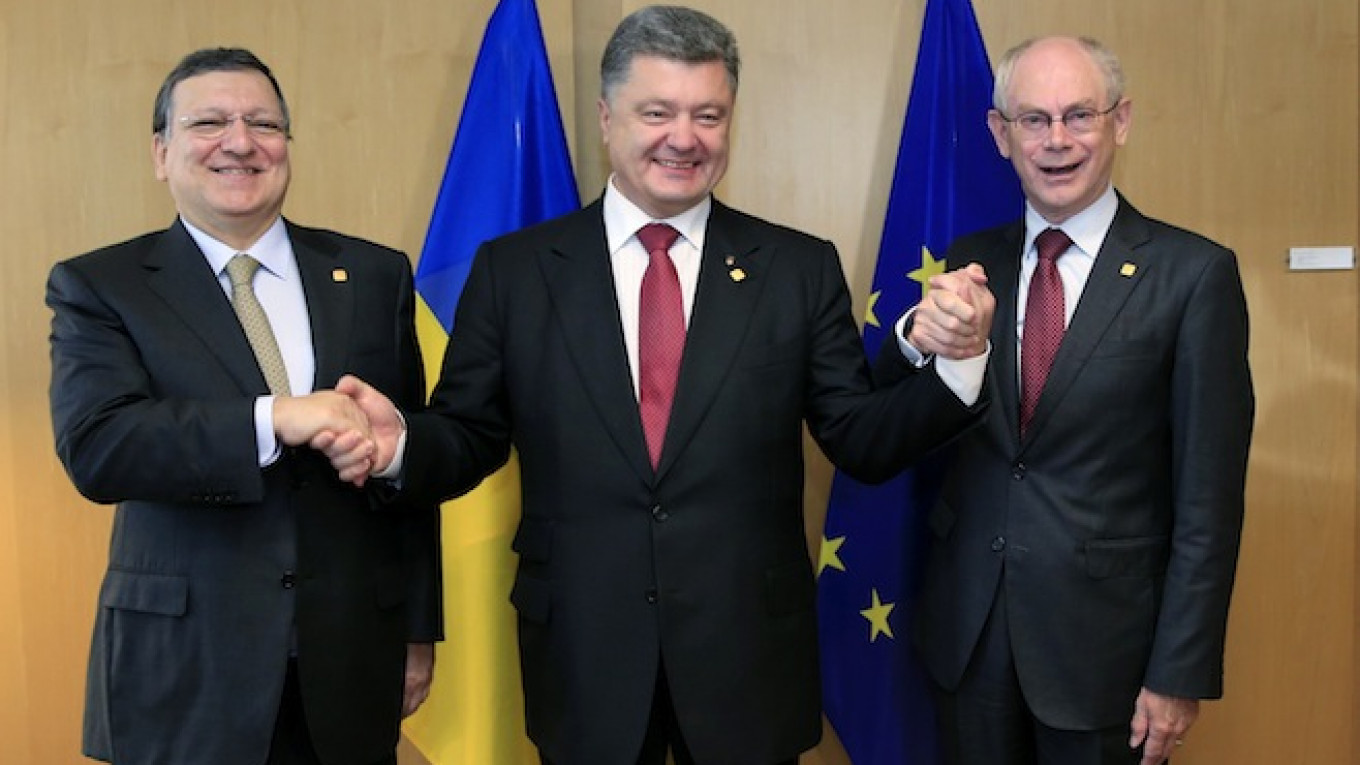BRUSSELS — European Union leaders will work to block loans for new projects in Russia by two multilateral lenders and broaden the scope of other sanctions in response to Moscow's actions in Ukraine, according to a draft statement seen by Reuters on Wednesday.
EU leaders, who meet in Brussels later on Wednesday, will step up sanctions because pro-Russian rebels in eastern Ukraine have not met their demands to end the violence there, the draft statement said.
The 28-nation EU has been under strong pressure from the United States and Ukraine to take a hard line against Russia.
EU leaders will ask the bloc's bank, the European Investment Bank, or EIB, to suspend financing of new public sector projects in Russia, the draft statement said.
EU countries will also work together to suspend funding for new projects in Russia through the European Bank for Reconstruction and Development, or EBRD, it said.
EU diplomats say taking action at the EBRD will be complicated as Russia is one of 64 countries that are shareholders of the bank.
Russia has traditionally been the biggest recipient of the London-based EBRD's funds — the bank lent 1.8 billion euros ($2.44 billion) there last year. The EIB pledged to lend more than 1 billion euros ($1.3 billion) to Russia last year.
The EU will broaden the scope of asset freezes to target companies and other organizations "that are supporting materially or financially actions undermining or threatening Ukraine's sovereignty, territorial integrity and independence," according to the draft statement.
If broadly interpreted, that change could have wide ramifications, potentially allowing the EU to target a range of Ukrainian or Russian companies.
The EU has so far imposed asset freezes on 72 people and two energy companies in Ukraine's Crimea region, which was annexed by Moscow earlier this year.
It has drawn up a list of hard-hitting sanctions on sectors of the Russian economy, but has held back from imposing them because some EU governments are wary of potential retaliation from Russia, the bloc's biggest energy supplier.
The EU leaders will also ask the European Commission to look into suspending EU bilateral and regional cooperation programs that benefit Russia. Projects dealing exclusively with civil society will be excluded, the draft said.
Some 450 million euros ($609 million) of EU funding are set to flow into Russia between 2014 and 2020 under various cooperation programs, according to the European Commission.
The EU leaders will also ask officials to draw up proposals for further measures to restrict investment in Crimea, whose annexation by Russia is not recognized by the EU.
The leaders will say they expect international financial institutions not to finance any project that recognizes the annexation of Crimea, according to the draft, which could still be changed following leaders' discussions.
See also:
Putin Wants Measures to Protect BRICS Nations From U.S. Sanctions
A Message from The Moscow Times:
Dear readers,
We are facing unprecedented challenges. Russia's Prosecutor General's Office has designated The Moscow Times as an "undesirable" organization, criminalizing our work and putting our staff at risk of prosecution. This follows our earlier unjust labeling as a "foreign agent."
These actions are direct attempts to silence independent journalism in Russia. The authorities claim our work "discredits the decisions of the Russian leadership." We see things differently: we strive to provide accurate, unbiased reporting on Russia.
We, the journalists of The Moscow Times, refuse to be silenced. But to continue our work, we need your help.
Your support, no matter how small, makes a world of difference. If you can, please support us monthly starting from just $2. It's quick to set up, and every contribution makes a significant impact.
By supporting The Moscow Times, you're defending open, independent journalism in the face of repression. Thank you for standing with us.
Remind me later.






